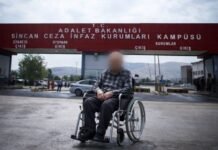
Nearly 650,000 people are still living in container cities two years after powerful earthquakes struck 11 provinces in southern and southeastern Turkey on February 6, 2023, according to data from the Disaster and Emergency Management Authority (AFAD), Turkish Minute reported.
The magnitude 7.8 and 7.5 earthquakes claimed the lives of 53,725 people, injured more than 107,000 and left millions homeless after the collapse of 518,000 homes, according to official data.
Since the earthquakes, survivors have faced a series of challenges, ranging from housing to issues in education, healthcare, infrastructure and the cost of living.
AFAD’s report titled “Integrated Disaster Management – Efforts in the Earthquake Zone” reveals the scale of the ongoing housing crisis in earthquake-affected cities 731 days after the earthquakes. As of February 2025, a total of 649,632 people are still living in container housing.
According to the report, Hatay, one of the cities hardest hit by the earthquakes, has the highest number of people still living in containers, totaling 218,379, followed by Malatya (112,726), Adıyaman (118,204) and Kahramanmaraş (107,896).
In April 2023 President Recep Tayyip Erdoğan announced that his government would build 650,000 new residences for earthquake victims over the course of a year, with 319,000 of those units scheduled to be completed and handed over to their owners by the end of that period.
Many had viewed Erdoğan’s remarks with skepticism and found his promise unrealistic since even removing the rubble would take months, and Turkey’s economic situation and human resources were insufficient for completing such a huge project in one year.
In a speech earlier this week, the president said his government had delivered 201,431 independent units as of the two-year mark, accounting for only 63 percent of the houses he had promised to build within a year for the disaster victims.
A recent statement on X by Murat Kurum, Turkey’s environment minister, also said that as of January 24, a total of 201,580 residences, village homes and workplaces had been delivered in the earthquake-affected region. Kurum also revised Erdoğan’s pledge of 650,000 new residences, stating that the total number is now expected to reach 452,983 by the end of 2025.
Speaking at a remembrance ceremony on Thursday in Adıyaman, where 8,000 people died, President Erdoğan said his government was working round the clock to rebuild what was lost.
“We will have built a total of 453,000 residences by the new year. We will not leave a single citizen without a home or workplace,” he said.
Women overwhelmed by problems in container cities
Living in a 21-square-meter container poses a challenge for women, who have to cope with a series of problems caused by the lack of proper housing.
Problems related to washing their laundry, humidity, mold and power cuts not only pose health risks but also challenge women mentally.
“Everything is cramped in a tiny room; even breathing becomes difficult. When you cook, steam fills the space; when you hang laundry, moisture builds up. And before you know it, the walls are covered in mold,” Gönül Bayram, who lives in a container city in Malatya, told Bianet.
Bayram added that she has to turn off the washing machine to use the electric stove and switch off other appliances when turning on the heater, making it necessary to plan every step carefully. She also said the container becomes freezing within half an hour during power cuts since only a thin metal sheet separates them from the ground.
Özlem, another container city resident in Malatya, said that drying laundry indoors causes excessive humidity and mold, adding that water drips from the walls inside when it snows.
Noting that her pregnancy makes the situation even more difficult for her, she added, “We survived the earthquake, but we are losing our health here.”
The women said maintaining a healthy life in container housing is nearly impossible, calling on the authorities to speed up housing construction process and to relocate them to permanent homes as soon as possible.














